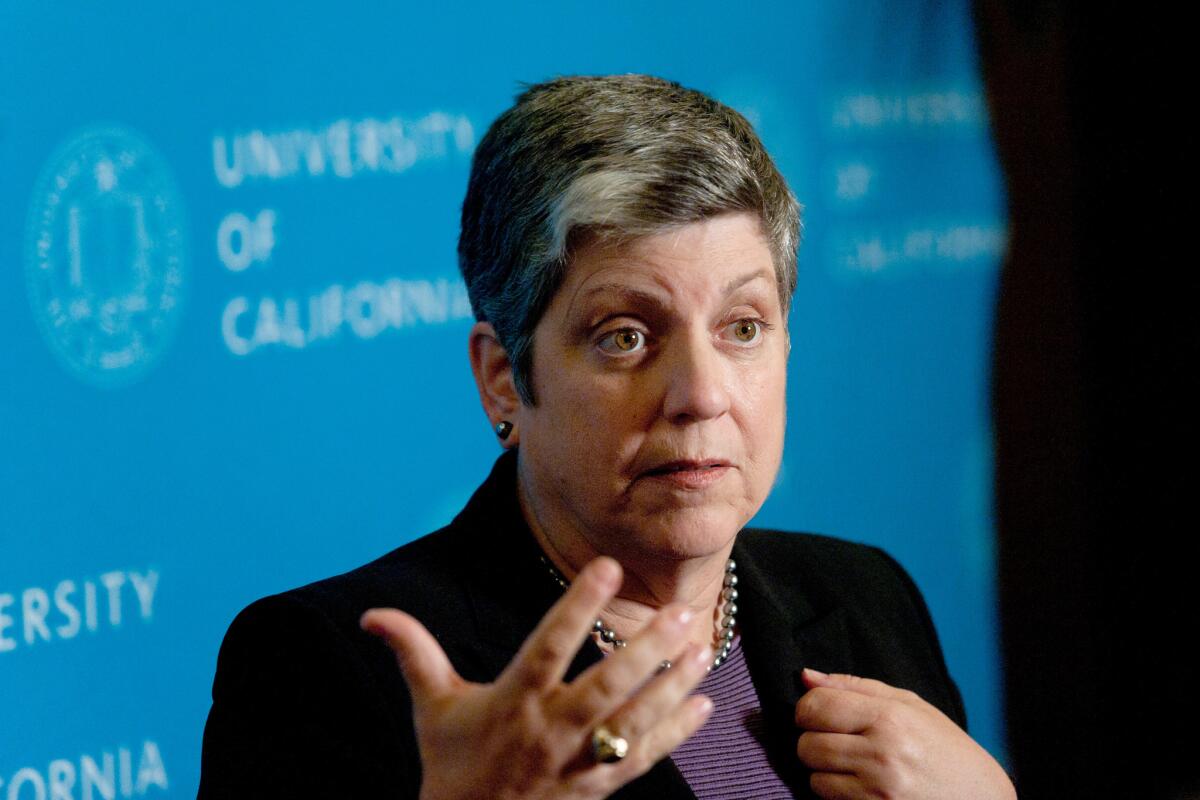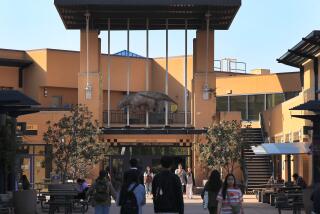UC to freeze California enrollment, cap UCLA, Berkeley non-residents

The UC system will not expand enrollment of California freshmen and transfer students in the fall unless more state revenues are appropriated and will cap enrollment of out-of-state students at UCLA and UC Berkeley, UC President Janet Napolitano said Tuesday.
Napolitano told a legislative hearing in Sacramento that the nine undergraduate UC campuses are poised to send out their acceptance and rejection letters and cannot wait to decide enrollment targets until the Legislature and governor make their final budget decisions later in the spring.
As a result, she said that campuses initially would accept the same numbers of Californians as last year, even though applications are up. However, she held out the possibility that more students may get accepted through the waiting list process and other measures in May and later.
âAbsent additional funding, UC is not in a financial position to absorb more California students beyond those we currently serve. As such, campuses have been instructed to keep their enrollment of California students flat, meaning that we are not in a position to add additional California resident students for whom there is no additional state support,â Napolitano told an Assembly budget subcommittee on education finance.
âWe will do all we can to mitigate this decision â through wait lists and deferred enrollment â and will work to make up any shortfall of new California students upon receiving increased funding in future years,â she said.
Napolitano is in the midst of a dispute with Gov. Jerry Brown over her plan to increase tuition by as much as 5% over each of the next five years if state funding does not rise enough. Brown so far is offering UC $120 million, or 4%, more in general revenues but only if tuition remains frozen in the fall for the fourth consecutive year.
In recent years, UC sharply increased the numbers of students from outside the state because they pay about $23,000 more in tuition than Californians do. But the rising presence of non-Californians is a hot political item, and legislative proposals to increase state funding to the UC require a freeze on their ranks.
On Tuesday, Napolitano said the level of non-Californians offered admission will be capped next year at UCLA and Berkeley, âwhere the demand is highest,â but she did not freeze it at the other seven undergraduate campuses. UC San Diego, Davis and Irvine also enroll significant numbers of non-Californians.
An unprecedented 20% of this yearâs freshman class across UC is from outside California and about 30% at UCLA and UC Berkeley. Though UC officials insist that Californians are not being excluded to make room for non-residents, many parents and legislators believe that UC has admitted far too many students from outside the state and are concerned that the practice hurts in-state studentsâ chances for admission.
âI also appreciate the concern about the level of non-resident student enrollment. As you know, non-resident enrollmentâand the additional tuition those students payâallow us to enroll more in-state students,â Napolitano said.
Napolitanoâs statements may be viewed as part of a delicate, carefully staged negotiating process in Sacramento. Two of the Legislatureâs top leaders criticized her for it.
Assembly Speaker Toni G. Atkins (D-San Diego) said she was âfrustrated over UCâs latest attempt to use students as bargaining chips.â
She said that a cap at UCLA and UC Berkeley, âwhile increasing out-of-state enrollment overall, does not solve the problem. UCâs job is to educate California students, not wait list them.â
Atkins has proposed additional state funding for UC, no tuition increase for Californians while hiking tuition for and freezing enrollment of non-residents.
Senate President pro Tempore Kevin de León (D-Los Angeles) said in a statement that California students are being offered âa back seatâ compared to those from outside the state.â
âWhile I understand the fiscal difficulties the university is facing, it is unfortunate that California students are caught in the middle of a funding battle that can be resolved without victimizing students and their families,â said De Leon, who also is advocating a freeze on in-state tuition and a large rise in fees for non-Californians.
About 103,000 California high school seniors have applied to UC for fall 2015 admission, about 3.2% more than last year.
Under the worst-case scenario, tuition for undergraduates who are California residents could rise to $12,804, not including room and board. By the 2019-20 school year, that could increase to $15,564, if state funding does not rise more than anticipated.
Follow me @larrygordonlat
More to Read
Sign up for Essential California
The most important California stories and recommendations in your inbox every morning.
You may occasionally receive promotional content from the Los Angeles Times.











